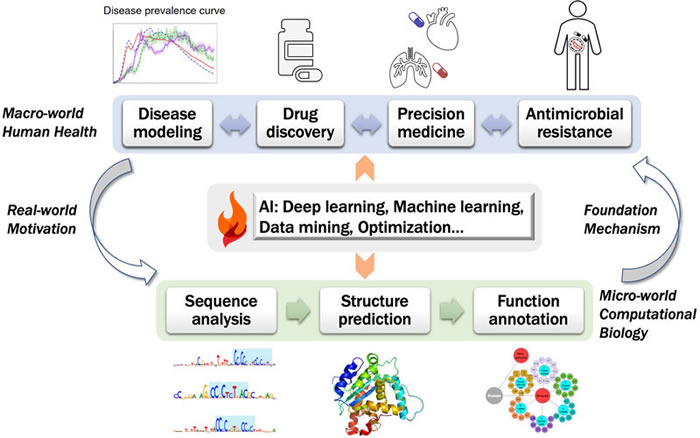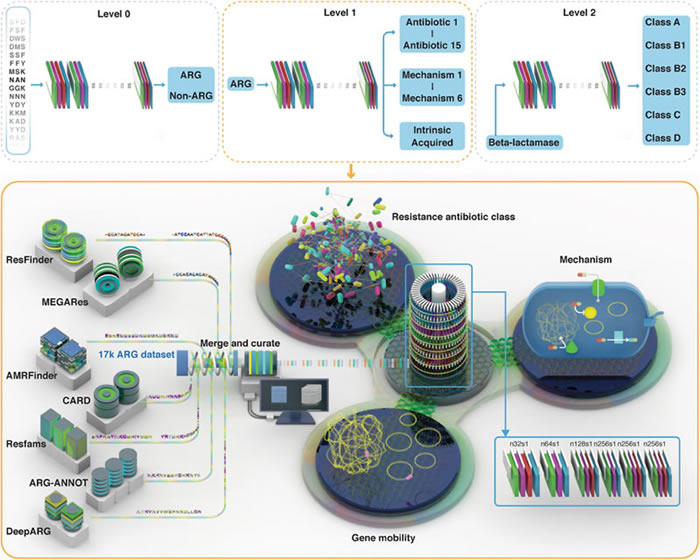 Prof. Yu Li has been selected for the Forbes 30 Under 30 Asia (Healthcare & Science Category) – Class of 2022. His research focuses on using data and AI algorithms to solve problems in the healthcare and biology fields, such as developing computational methods to better identify antibiotic resistance genes. It tries to combat antibiotic resistance, one of the more urgent global health threats, with AI. He has published more than 45 papers in academic journals including Nature Communications and Bioinformatics.
Prof. Yu Li has been selected for the Forbes 30 Under 30 Asia (Healthcare & Science Category) – Class of 2022. His research focuses on using data and AI algorithms to solve problems in the healthcare and biology fields, such as developing computational methods to better identify antibiotic resistance genes. It tries to combat antibiotic resistance, one of the more urgent global health threats, with AI. He has published more than 45 papers in academic journals including Nature Communications and Bioinformatics.
“I feel very honored and humbled to be listed. I really appreciate that my previous works in this field have been acknowledged,” said Prof. Li.
Forbes announced its seventh annual “30 Under 30 Asia” list, featuring 300 young entrepreneurs, leaders, and trailblazers across the Asia-Pacific region, all under the age of 30, who are inspiring change and driving innovation in their respective fields amid the challenges brought about by the Covid-19 pandemic.
Rana Wehbe Watson, Forbes 30 Under 30 Asia Editor, said: “Entrepreneurs and innovators on this year’s Forbes 30 Under 30 Asia list are working towards reconnecting Asia, after the disruption and isolation of the Covid-19 pandemic.”
From Biosciences Undergrad to Computer Science Professor
“I indeed have dreamed of being a researcher and scientist since I was a child.” Prof. Li believed that researchers are one of the main horsepowers of society who create impacts and drive the world forward. “I will feel very proud of myself if I bring a positive impact on society.”
He majored in Biosciences during his undergraduate period at USTC. He then changed his major to Computer Science for his Master degree and Ph. D. at KAUST. Finally, he came to CUHK and became a faculty member of the CSE department.
He rapidly adjusted himself from a student to a faculty member, which means an independent research group leader, a college teacher, and a team manager. He learned a lot of things in a very short time, such as life in HK and CUHK, teaching, writing proposals, recruiting team members, guiding students, and building up collaborations with other researchers. During the period, lots of unexpected obstacles and failures, such as the COVID-19 outbreak, funding application, and paper rejection happened intensively in one year.
With the help of the professors and staff team from CUHK and SZRI, his group members, and Prof. Li’s own hard-working, he has successfully built up the core research team and gotten familiar with things in CUHK.
“I would say my path to research includes dreams, luck, and careful planning,” said Prof. Li.
Research and Society

Prof. Li is working at the intersection between machine learning, healthcare, and bioinformatics, developing new machine learning methods to resolve the computational problems in biology and healthcare.
One major research topic in his group is combating antibiotic resistance with AI. Their previous work has been acknowledged and appreciated.
Prof. Li’s group developed HMD-ARG, the world’s first algorithm to predict antibiotic resistance genes based on hierarchical deep learning. It can diagnose which antibiotics are ineffective for the patients. Experiments from the clinical collaborators have validated the prediction from the algorithm. Besides, they are collaborating with MIT to discover new effective drugs. The project can facilitate drug prescribing and combating antibiotic resistance.
Apart from that, Prof. Li works on more projects related to computer science and healthcare.
His group is collaborating with several institutes, including HKU, HKUST, and NTU, on developing privacy-preserving AI methods to predict Gastric cancer development based on the patients’ electronic health records. Cancer pre-screening and early treatment can be performed, which will increase the patients’ survival rate greatly.
Meanwhile, his work, NucleicNet, is the first deep learning-based framework to predict the spatial selectivity of protein-RNA interactions at a high resolution, which can facilitate RNA design to improve the efficiency of bioengineering using the Ago system. The work was published in Nature Communications and has been widely recognized by peers and recommended by F1000Prime, a high-quality research-sharing platform.
Prof. Li is very confident in the combination of machine learning with healthcare and biology. “We can potentially discover new drugs for diseases that have tortured us for decades, improving the healthcare system of society and promoting people’s living standards,” he highlighted.
Keep Working and Sharing
“This honor also serves as another starting point, pushing me to accomplish more works with an even larger impact on society in the future,” said Prof. Li.
In the next several years, he will continue working on the AI & Healthcare and Bioinformatics research problems, such as combating antibiotic resistance with AI, RNA structure and function prediction, as well as AI and single-cell sequencing facilitated precision medicine.
Prof. Li claimed himself as a practitioner. “I do not want to limit the technology in academia. Instead, I want to share the technology with society.” He will collaborate with the hospital and industry to perform technology transformation. Hopefully, society can enjoy the research advancement from his group soon.
Consolidate the Basics and Start Early
“The world is changing rapidly, and most of the challenges and opportunities are in the interdisciplinary fields, especially related to healthcare,” Prof. Li said. He believes that AI & Healthcare and Bioinformatics are a new rising research direction.
Here are some tips shared by Prof. Li for students who also wish to participate in research work.
For those who are still in their first year or second year, Prof. Li encourage them to pay more attention to the fundamental courses before jumping into AI courses, especially Mathematics courses. “Math is the foundation,” Prof. Li emphasized.
Meanwhile, he suggests taking some courses which seem not useful to computer science students, such as physics, chemistry, and biology. “These courses may eventually benefit interdisciplinary research in the future.”
He highlighted the importance of going in the right direction early. “The later you enter, the more severe the competition will be,” Prof. Li concluded, “try to do research as early as possible so that you will know whether you are interested in it.”
